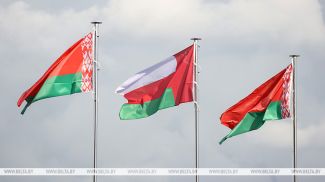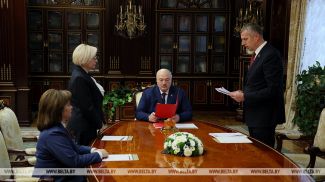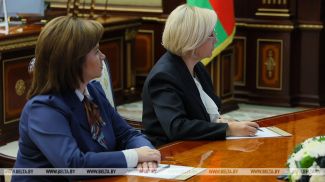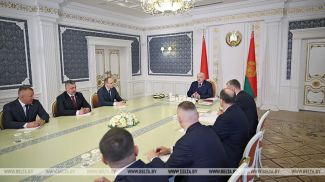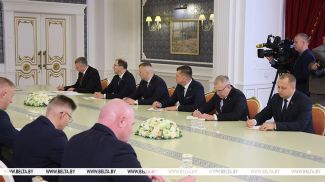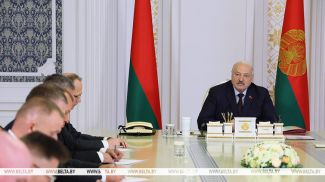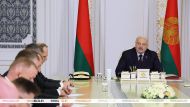
MOGILEV, 28 May (BelTA) – During his speech at the Belarus Media Forum on 28 May, Belarusian President Aleksandr Lukashenko outlined a seven-point strategy to improve the domestic mass media, BelTA has learned.
Assessing the work of mass media, the head of state named areas where improvements should be made.
According to the president, the first thing that needs to be done is to develop a national media style and increase the share of Belarus’ own high-quality, competitive content. “I do not mind foreign content, but everything that we buy must be aligned with our way of life, traditions, culture, mentality. We should not pollute our media landscape with bloody, immoral and vulgar stories. I have already spoken about this. We need an ideological filter,” Aleksandr Lukashenko emphasized.
The next step is to bring in more experts. “We have bright speakers and analysts, but they should not be on the air too much (this is one of the shortcomings, which is particularly common for national media). Otherwise, viewers will tune out as they are used to more diverse content,” the president warned. “You know this. We need new faces. You need to look for such experts in the regions and in various professional communities.”

Aleksandr Lukashenko believes that journalists and experts have become too fixated on Minsk and geopolitics. “Where are opinion leaders from among doctors, teachers, scientists, entrepreneurs and other professionals? There are hundreds, if not thousands of them. People know them and trust them. We need to give them a platform,” the president said.
It is necessary to intensify propaganda and counter-propaganda, as well as ideological work. It was the third step named by the head of state. “I want young journalists to understand this. There is no need to be shy about such words and concepts. Do you think the West is not doing this? They just call it differently – public relations. The essence is the same. So let them work with public opinion on their territory.”
“We do not buy this nonsense about independent media and democratic values. They throw their journalists in jail, shut down media organizations and harass everyone who dares to disagree with the policies and actions of the authorities,” noted Aleksandr Lukashenko. Examples are many across the world - from the USA and the European Union to Moldova, the Baltic states, Ukraine and Georgia.
Some may try to draw some parallels with the situation in Belarus in 2020, but this would be absolutely wrong. In Belarus, individual journalists were held accountable not for their opinions or positions, but for acting like traitors - they began to sow chaos in the country. “We pushed back. We went after journalists for violating the laws,” the head of state emphasized.
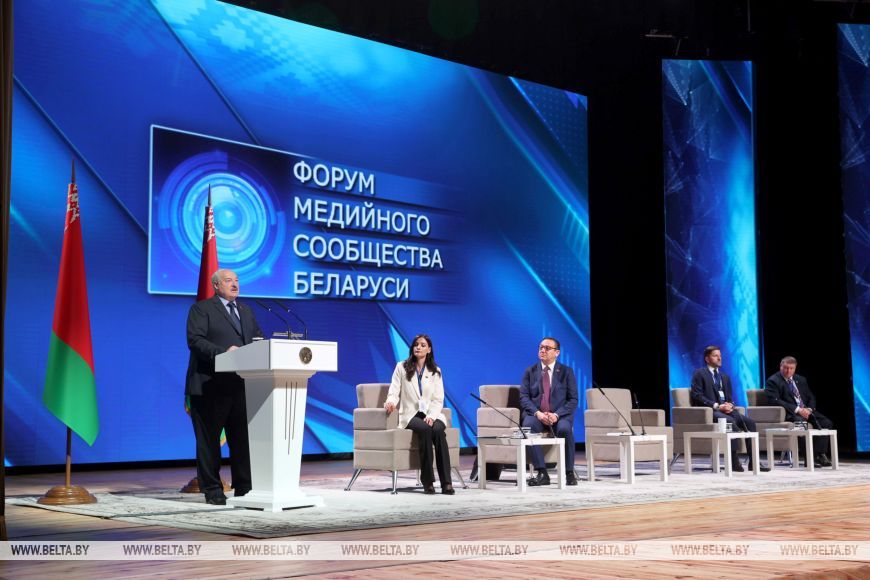
The fourth thing the president mentioned was maintaining a balance between hawkish and dovish reporting in mass media. Both reporting styles should equally resonate with the audience.
“Of course, from the professional point of view, ‘fiery’ reporting gets more views,” said the head of state. “But we also need to make mundane stories spectacular and memorable.”
The president believes that people need stories about day-to-day life. “When you professionally show an ordinary, humble combine harvester with dirty hands, who got off this ship (I mean a combine harvester made in our country), and he begins to talk to you, it’s nice to watch this even if his talking is a bit awkward. This is a person who performs feats every day by producing food for us. Do these reports more often. If you show war, you should also show everyday work, because we don’t want to go to war, and I really hope that we won’t,” Aleksandr Lukashenko said.
It is necessary to expand presence on popular digital platforms, translate and voice materials into other languages, Aleksandr Lukashenko said.
“I have never demanded filtering information and creating ‘an alternative reality’ of general welfare in the media and hushing up problems. You know my approach: people should see and know the truth and make conclusions,” the president stressed.
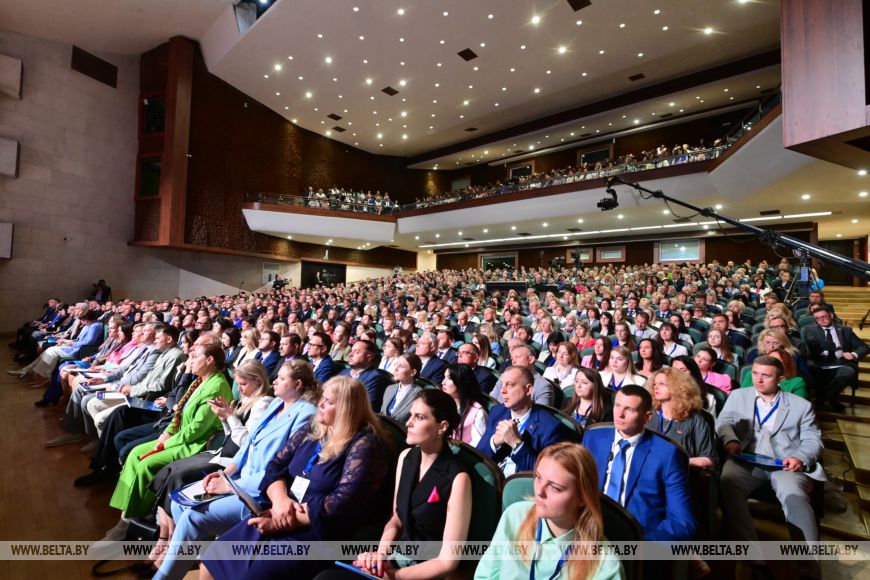
“Some local officials react very painfully when some problems get media attention. This is a bad trend. Media should not paper over problems. Every country has them. But they must be covered objectively, without ill-natured criticism and exaggeration,” the president remarked.
It is important to present different points of view, including critical ones, both on air and in the press. “Avoid nitpicking. We don’t need it (they throw this dirt at us from all sides - from east and west, north and south). Reporting should be done in a businesslike way and have an impact,” Aleksandr Lukashenko emphasized. In this regard, the president recalled that the target of criticism should respond to these critiques.
The head of state emphasized that critical remarks are legitimate and important, journalists should not steer clear of them and hush up problems: “The state does not need this. I don’t need this either. I urge you once again to be careful; do not act like a wrecking ball. Word has always been a very dangerous instrument. Therefore, you need to know how to use it in the right way. Criticize where necessary, but also give credit where credit is due,” the president said. It is necessary to maintain a balance of positive and critical materials in the media, without pretending that everything is fine, Aleksandr Lukashenko is convinced.
The head of state also gave his take on author’s journalism. He praised and criticized those who are trying to do this type of journalism.
Assessing the work of mass media, the head of state named areas where improvements should be made.
According to the president, the first thing that needs to be done is to develop a national media style and increase the share of Belarus’ own high-quality, competitive content. “I do not mind foreign content, but everything that we buy must be aligned with our way of life, traditions, culture, mentality. We should not pollute our media landscape with bloody, immoral and vulgar stories. I have already spoken about this. We need an ideological filter,” Aleksandr Lukashenko emphasized.
The next step is to bring in more experts. “We have bright speakers and analysts, but they should not be on the air too much (this is one of the shortcomings, which is particularly common for national media). Otherwise, viewers will tune out as they are used to more diverse content,” the president warned. “You know this. We need new faces. You need to look for such experts in the regions and in various professional communities.”

Aleksandr Lukashenko believes that journalists and experts have become too fixated on Minsk and geopolitics. “Where are opinion leaders from among doctors, teachers, scientists, entrepreneurs and other professionals? There are hundreds, if not thousands of them. People know them and trust them. We need to give them a platform,” the president said.
It is necessary to intensify propaganda and counter-propaganda, as well as ideological work. It was the third step named by the head of state. “I want young journalists to understand this. There is no need to be shy about such words and concepts. Do you think the West is not doing this? They just call it differently – public relations. The essence is the same. So let them work with public opinion on their territory.”
“We do not buy this nonsense about independent media and democratic values. They throw their journalists in jail, shut down media organizations and harass everyone who dares to disagree with the policies and actions of the authorities,” noted Aleksandr Lukashenko. Examples are many across the world - from the USA and the European Union to Moldova, the Baltic states, Ukraine and Georgia.
Some may try to draw some parallels with the situation in Belarus in 2020, but this would be absolutely wrong. In Belarus, individual journalists were held accountable not for their opinions or positions, but for acting like traitors - they began to sow chaos in the country. “We pushed back. We went after journalists for violating the laws,” the head of state emphasized.

The fourth thing the president mentioned was maintaining a balance between hawkish and dovish reporting in mass media. Both reporting styles should equally resonate with the audience.
“Of course, from the professional point of view, ‘fiery’ reporting gets more views,” said the head of state. “But we also need to make mundane stories spectacular and memorable.”
The president believes that people need stories about day-to-day life. “When you professionally show an ordinary, humble combine harvester with dirty hands, who got off this ship (I mean a combine harvester made in our country), and he begins to talk to you, it’s nice to watch this even if his talking is a bit awkward. This is a person who performs feats every day by producing food for us. Do these reports more often. If you show war, you should also show everyday work, because we don’t want to go to war, and I really hope that we won’t,” Aleksandr Lukashenko said.
It is necessary to expand presence on popular digital platforms, translate and voice materials into other languages, Aleksandr Lukashenko said.
“I have never demanded filtering information and creating ‘an alternative reality’ of general welfare in the media and hushing up problems. You know my approach: people should see and know the truth and make conclusions,” the president stressed.

“Some local officials react very painfully when some problems get media attention. This is a bad trend. Media should not paper over problems. Every country has them. But they must be covered objectively, without ill-natured criticism and exaggeration,” the president remarked.
It is important to present different points of view, including critical ones, both on air and in the press. “Avoid nitpicking. We don’t need it (they throw this dirt at us from all sides - from east and west, north and south). Reporting should be done in a businesslike way and have an impact,” Aleksandr Lukashenko emphasized. In this regard, the president recalled that the target of criticism should respond to these critiques.
The head of state emphasized that critical remarks are legitimate and important, journalists should not steer clear of them and hush up problems: “The state does not need this. I don’t need this either. I urge you once again to be careful; do not act like a wrecking ball. Word has always been a very dangerous instrument. Therefore, you need to know how to use it in the right way. Criticize where necessary, but also give credit where credit is due,” the president said. It is necessary to maintain a balance of positive and critical materials in the media, without pretending that everything is fine, Aleksandr Lukashenko is convinced.
The head of state also gave his take on author’s journalism. He praised and criticized those who are trying to do this type of journalism.
This genre is very labor-intensive and usually requires a team of professionals to work on such projects. It is necessary to improve the quality of such journalism, the president said. He told media executives to set a certain bar for journalists and also improve professional training.
The sixth priority concerns the work of newspapers and magazines. The Belarus President Administration believes that newspapers and magazines should turn into highbrow media in a good sense of this word. The head of state expressed some doubt about it: “It’s possible. I hope that this will happen.”
Aleksandr Lukashenko remarked that newspapers, like theater, are now increasingly viewed as high art. “It’s a flattering characterization, but it needs to be justified,” the Belarusian leader emphasized. “It does not make sense for them to compete with online media. It’s useless. The niche of print media is professional analytics and punchy op-eds. Each media outlet should have its own heroes.”
Speaking about online media, the head of state noted that it represents a challenge for journalists. “The media landscape has no boundaries, in every sense,” the president noted. “The lack of moral and ethical boundaries is especially disturbing. No matter how difficult it may be, journalists should rise to this challenge.”
“Our journalists and experts should be more active in the digital community. It is important to learn to identify and challenge fake news created by artificial intelligence,” Aleksandr Lukashenko remarked. “This is hard, but it should be done. We have not yet delved deep into this matter, but it is high time we do.”
The internet is of great importance, but it has both positive and negative sides. For Belarus and its mass media, this is a tool to provide factual, objective coverage of what is happening in the country. “Firstly, there is no escaping the internet. Secondly, there is plenty of dirt and vulgarity there. We have to fight endlessly with some things on the Internet, such as [instructions] how to make a bomb and detonate it. Although there is a lot of trash there, this is also the greatest achievement. And we need to learn to use the internet [in the best interests of the country]. And our journalists are already doing it. Belarusian media outlets are increasing their presence in the internet, and this gives audiences in other countries the opportunity to learn the truth about Belarus. “People compare. And the truth always prevails,” noted Aleksandr Lukashenko.
Summing up what was said, the head of state expressed confidence that the participants of the media forum will come up with new ideas that will help address unresolved issues.
Such a large-scale event that gathered journalists, experts, communication specialists, government officials is more relevant than ever, the president emphasized.
It is symbolic that the forum was held in May when Belarus marks Victory Day. Another important date in Belarus’ history - the 80th anniversary of the liberation of Belarus from the Nazi invaders – is ahead.
“The heroic history of the Soviet people is our greatest asset. It is our main teacher,” Aleksandr Lukashenko emphasized. In his words, during the Great Patriotic War, the occupation of Belarus there was a fierce battle for the future - not only on the frontline, but also on the pages of newspapers, on the radio. The press in the occupied territories published poems and prose by collaborators who swore an oath of allegiance to Hitler. They spoke about the “beautiful future” of Belarusians under the rule of “great Germany” with orientation on the “new Europe”, spread myths about atrocities of partisans, Bolsheviks and others, promised some “freedoms”.
“We know the price of these ‘freedoms’ and the new ‘European future’ - every third resident of Belarus was killed in that war. Maybe even every second one, given the ongoing investigation of the General Prosecutor's Office on genocide,” the president said.
Aleksandr Lukashenko stressed that war correspondents should get more spotlight during the celebration of the Great Victory and Independence Day. “They also destroyed the enemy. They destroyed them with the word, which gave strength to the Red Army soldiers and raised thier morale to fight for the Motherland, for what we have today. They won,” the Belarusian leader said.
“We also have a lot of victories on the information front. We know what we are fighting for. For the sovereignty of Belarus, our national dignity, the future of our children,” the head of state said.
“I don’t want any war. I am sure that the overwhelming majority [of people] in Belarus do not want war, either,” said the head of state. Aleksandr Lukashenko emphasized that he keeps explaining how terrible any war is using simple examples. “Not a single Belarusian wants to ruin their life and rot in the trenches,” the president remarked. “That’s why I don’t want war and I do everything I can to prevent it from happening.”
Indeed, there is a lot of talk in the country about the dangers of the current moment, about various kinds of alarming signals, about the high likelihood of a violent confrontation, Aleksandr Lukashenko noted. He partially attributes it to the history of the Great Patriotic War that the country’s authorities failed to predict and get ready for. “That’s why we should be on the alert. I keep telling the military: we must be prepared for this. That’s why we are beefing up our western border,” the head of state explained. Taking into account the experience of the Brest Fortress that was seized by the enemy at the very beginning of the war, Belarus is now building defensive structures further from the border, so that Belarusian soldiers, if attacked, could hold out there as long as possible.
“I use [mass media] as a tool to explain to people what is happening and to convey my response. This does not mean that Lukashenko is an ‘aggressor’, as they call me, especially in Poland, and wants war. I reject war even more vehemently than millions of Belarusians,” the Belarusian leader emphasized.
Aleksandr Lukashenko remarked that newspapers, like theater, are now increasingly viewed as high art. “It’s a flattering characterization, but it needs to be justified,” the Belarusian leader emphasized. “It does not make sense for them to compete with online media. It’s useless. The niche of print media is professional analytics and punchy op-eds. Each media outlet should have its own heroes.”
Speaking about online media, the head of state noted that it represents a challenge for journalists. “The media landscape has no boundaries, in every sense,” the president noted. “The lack of moral and ethical boundaries is especially disturbing. No matter how difficult it may be, journalists should rise to this challenge.”
“Our journalists and experts should be more active in the digital community. It is important to learn to identify and challenge fake news created by artificial intelligence,” Aleksandr Lukashenko remarked. “This is hard, but it should be done. We have not yet delved deep into this matter, but it is high time we do.”
The internet is of great importance, but it has both positive and negative sides. For Belarus and its mass media, this is a tool to provide factual, objective coverage of what is happening in the country. “Firstly, there is no escaping the internet. Secondly, there is plenty of dirt and vulgarity there. We have to fight endlessly with some things on the Internet, such as [instructions] how to make a bomb and detonate it. Although there is a lot of trash there, this is also the greatest achievement. And we need to learn to use the internet [in the best interests of the country]. And our journalists are already doing it. Belarusian media outlets are increasing their presence in the internet, and this gives audiences in other countries the opportunity to learn the truth about Belarus. “People compare. And the truth always prevails,” noted Aleksandr Lukashenko.
Summing up what was said, the head of state expressed confidence that the participants of the media forum will come up with new ideas that will help address unresolved issues.
Such a large-scale event that gathered journalists, experts, communication specialists, government officials is more relevant than ever, the president emphasized.
It is symbolic that the forum was held in May when Belarus marks Victory Day. Another important date in Belarus’ history - the 80th anniversary of the liberation of Belarus from the Nazi invaders – is ahead.
“The heroic history of the Soviet people is our greatest asset. It is our main teacher,” Aleksandr Lukashenko emphasized. In his words, during the Great Patriotic War, the occupation of Belarus there was a fierce battle for the future - not only on the frontline, but also on the pages of newspapers, on the radio. The press in the occupied territories published poems and prose by collaborators who swore an oath of allegiance to Hitler. They spoke about the “beautiful future” of Belarusians under the rule of “great Germany” with orientation on the “new Europe”, spread myths about atrocities of partisans, Bolsheviks and others, promised some “freedoms”.
“We know the price of these ‘freedoms’ and the new ‘European future’ - every third resident of Belarus was killed in that war. Maybe even every second one, given the ongoing investigation of the General Prosecutor's Office on genocide,” the president said.
Aleksandr Lukashenko stressed that war correspondents should get more spotlight during the celebration of the Great Victory and Independence Day. “They also destroyed the enemy. They destroyed them with the word, which gave strength to the Red Army soldiers and raised thier morale to fight for the Motherland, for what we have today. They won,” the Belarusian leader said.
“We also have a lot of victories on the information front. We know what we are fighting for. For the sovereignty of Belarus, our national dignity, the future of our children,” the head of state said.
“I don’t want any war. I am sure that the overwhelming majority [of people] in Belarus do not want war, either,” said the head of state. Aleksandr Lukashenko emphasized that he keeps explaining how terrible any war is using simple examples. “Not a single Belarusian wants to ruin their life and rot in the trenches,” the president remarked. “That’s why I don’t want war and I do everything I can to prevent it from happening.”
Indeed, there is a lot of talk in the country about the dangers of the current moment, about various kinds of alarming signals, about the high likelihood of a violent confrontation, Aleksandr Lukashenko noted. He partially attributes it to the history of the Great Patriotic War that the country’s authorities failed to predict and get ready for. “That’s why we should be on the alert. I keep telling the military: we must be prepared for this. That’s why we are beefing up our western border,” the head of state explained. Taking into account the experience of the Brest Fortress that was seized by the enemy at the very beginning of the war, Belarus is now building defensive structures further from the border, so that Belarusian soldiers, if attacked, could hold out there as long as possible.
“I use [mass media] as a tool to explain to people what is happening and to convey my response. This does not mean that Lukashenko is an ‘aggressor’, as they call me, especially in Poland, and wants war. I reject war even more vehemently than millions of Belarusians,” the Belarusian leader emphasized.




